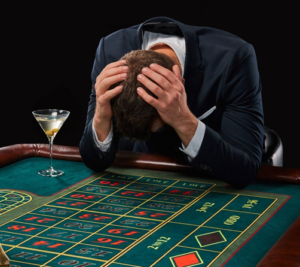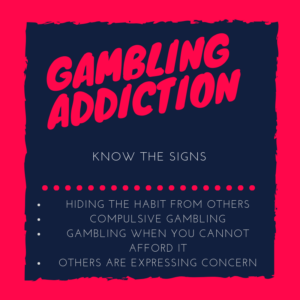Jean Gabriel | June 12, 2023 | Updated on: August 29th, 2023
Welcome to our all-encompassing exploration of gambling addiction. While gambling often brings entertainment and leisure to many, it’s imperative to acknowledge that it can evolve into a problematic behavior for certain individuals. This page is dedicated to illuminating the intricacies of gambling addiction, debunking prevalent misconceptions, identifying warning signs and symptoms, and offering practical recommendations for surmounting this formidable challenge.
Understanding Gambling Addiction
Gambling addiction, also referred to as compulsive gambling or pathological gambling, is a behavioral ailment characterized by an individual’s inability to resist the compulsion to gamble, even when faced with negative outcomes. It’s a progressive condition with profound repercussions on personal, financial, and social aspects of one’s life.
The Realm of Gambling Addiction
- Dismantling Misconceptions: The Reality of Problem Gambling
- Misconception: Problem gambling signifies a lack of strong willpower.
- Reality: Gambling addiction is a multifaceted disorder shaped by diverse elements such as genetics, environment, and psychological factors. It’s not solely a result of feeble willpower.
- Misconception: Only excessive gamblers can succumb to gambling addiction.
- Reality: Gambling addiction can affect individuals irrespective of the frequency or magnitude of their gambling activities. The addiction hinges on the uncontrollable impulse and adverse consequences, not the extent of gambling involvement.
- Misconception: Gambling addiction exclusively impacts specific demographics.
- Reality: Gambling addiction can touch anyone, regardless of age, gender, ethnicity, or socioeconomic status. It transcends demographic boundaries.
- Misconception: Individuals with gambling issues can quit independently.
- Reality: Overcoming gambling addiction frequently demands professional intervention, support from loved ones, and a comprehensive treatment blueprint. It’s not as straightforward as abruptly discontinuing gambling.
- Misconception: Gambling addiction is a harmless pastime.
- Reality: Problematic gambling can yield grave consequences, including financial devastation, strained relationships, mental health disorders, and even suicide. It’s far from being innocuous.

Recognizing and Decoding Signs of Gambling Addiction
Discerning the indicators and symptoms of gambling addiction is pivotal for early intervention. Some common cues encompass:
- An incessant preoccupation with gambling and constant rumination about it.
- Escalating sums of money and time expended on gambling activities.
- Failed endeavors to curtail or cease gambling.
- Restlessness or irritability when attempting to cut back or quit gambling.
- Engaging in deceit to conceal the magnitude of gambling engagement.
- Neglecting personal and professional responsibilities due to gambling.
- Borrowing funds or resorting to illegal undertakings to sustain gambling habits.
Guidance for Self-Rescue from Gambling Woes
If you suspect a gambling predicament, consider these self-aid strategies:
- Acknowledge the issue: Acknowledge and embrace the reality of your gambling addiction. Honesty serves as the inaugural stride toward recovery.
- Educate yourself: Garner insights into gambling addiction, its origins, and potential consequences. Knowledge empowers you to regain command over your situation.
- Set boundaries: Establish stringent limits for gambling pursuits, spanning time and financial restrictions. Adhere to these limits and steer clear of circumstances that could trigger compulsive gambling tendencies.
- Seek camaraderie: Connect with trusted friends, family members, or support groups designed for gambling addiction. Sharing your hardships and garnering support can wield significant transformation.
- Prioritize self-care: Engage in endeavors nurturing mental and emotional well-being, like relaxation practices, hobbies, and physical exercise. Tending to yourself might diminish the impulse to gamble.
Strategies for Perpetual Abandonment of Gambling
Conquering gambling addiction necessitates commitment and persistence. Here are strategies to aid your journey to recovery:
- Consider professional aid: Solicit guidance from adept therapists or addiction counselors specializing in gambling disorders.
- Erect obstacles to gambling access: Employ software or apps to limit access to gambling platforms or venues.
- Manage finances astutely: Entrust control of your financial matters to a reliable individual, establish a stringent budget, and abstain from carrying surplus cash or credit cards.
- Forge a support network: Surround yourself with empathetic and supportive individuals capable of providing solace during trying times.
- Occupy your hours: Embrace constructive and gratifying activities to occupy your time and divert your attention away from gambling.

Upholding a Gambling-Stricken Loved One: Imperatives and Inadvisables
If someone dear to you is grappling with gambling addiction, approaching the situation with empathy, understanding, and backing is imperative. Here’s guidance on navigating this complex scenario:
Dos:
- Educate yourself: Invest time in comprehending gambling addiction, its origins, and the repercussions on sufferers and their circles. Enhanced knowledge equips you to proffer more effective support while sidestepping misconceptions.
- Express concerns compassionately: Approach your loved one tactfully, voicing your apprehensions about their gambling inclinations in a non-judgmental, compassionate manner. Concentrate on the adverse outcomes instead of resorting to criticism.
- Cultivate open dialogue: Cultivate a secure and encouraging atmosphere where your loved one feels at ease sharing their tribulations and emotions. Listen attentively, without interjection or condemnation, and validate their sentiments.
- Extend emotional succor: Offer assurance to your loved one, serving as an emotional pillar throughout their quest for recovery. Motivate them to vocalize their feelings, while demonstrating patience and understanding during vulnerable instances.
- Assist with pragmatic matters: Aid your loved one in judiciously managing their finances. Propose help in devising a budget, discharging bills, or temporarily controlling their fiscal affairs to prevent further damage from gambling.
Don’ts:
- Shun enabling: Refrain from offering financial bailouts or camouflaging the aftermath of their gambling actions. Enabling can perpetuate the addiction, obstructing their incentive to seek help.
- Avert lectures: Steer clear of admonishing or sermonizing your loved one regarding their addiction. Such lectures can foment defensiveness and create distance, impeding their inclination to confide or request assistance.
- Abstain from judgment: Refrain from casting judgment or censure on your loved one. Direct your focus toward comprehension and encouragement during their recovery odyssey. Bear in mind, addiction is intricate, and empathy carries significant weight.
- Disown responsibility: Acknowledge your inability to govern or “repair” your loved one’s addiction. Gambling addiction is a personal battle that hinges on their commitment and endeavor to surmount. Abstain from attributing blame to yourself or presuming responsibility for their conduct.
- Neglect your well-being: Furnishing emotional support to a loved one grappling with gambling addiction can be strenuous. Prioritize your own well-being and contemplate seeking assistance for yourself. Take breaks, embrace self-care rituals, and contemplate joining support groups designed for the kin of addicts.
Embarking on the Path to Grasping Gambling Addiction
Understanding the core of gambling addiction, discerning the cues, and soliciting aid constitute critical steps toward conquering this trial. Remember, you’re not alone, and the prospect of recovery exists. By incorporating self-help methodologies and soliciting professional intervention, you can recapture dominion over your life and disentangle yourself from the clutches of gambling addiction.
